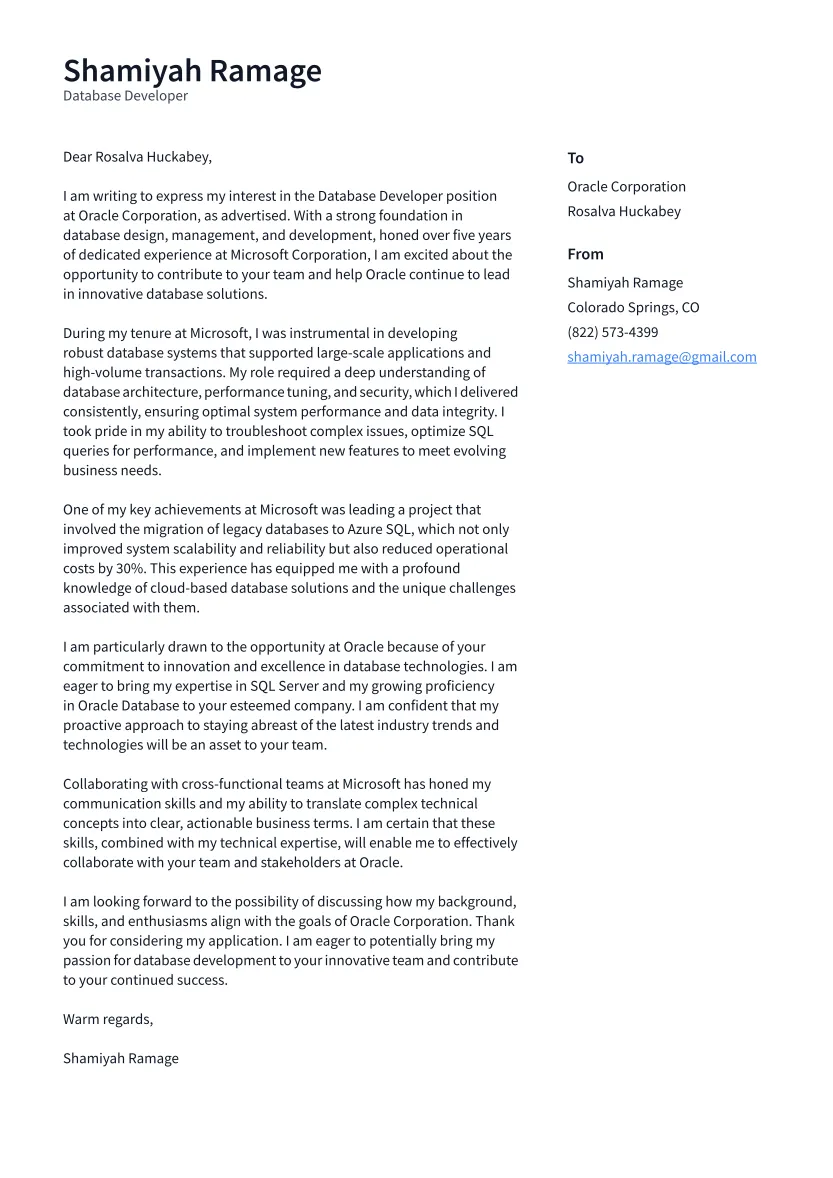Understand the Importance of a Cover Letter
In the competitive landscape of database development, a cover letter serves as your initial handshake with potential employers. It’s your opportunity to make a strong first impression, showcasing not just your skills but also your personality and enthusiasm for the role. A well-crafted cover letter provides context to your resume, allowing you to elaborate on your experiences and explain how they align with the specific requirements of the job. Recruiters often review cover letters to understand your communication skills, attention to detail, and overall fit within the company culture. A compelling cover letter can significantly increase your chances of getting noticed and securing an interview, ultimately landing you your dream job in database development. This crucial document sets the stage for a more in-depth discussion about your qualifications, setting you apart from other applicants.
Craft a Compelling Opening
Your opening paragraph is the first chance to grab a recruiter’s attention, so it needs to be impactful. Avoid generic greetings like “To Whom It May Concern.” Instead, personalize your letter by addressing the hiring manager by name if possible. Start with a statement that highlights your passion for database development and your understanding of the company’s mission. For example, express excitement about their innovative projects or your enthusiasm for contributing to their team. Briefly mention your most relevant skills and experience, emphasizing how they align with the job requirements. This initial paragraph sets the tone for the rest of your letter, indicating your genuine interest and setting the stage for a positive introduction. An effective opening should be concise, enthusiastic, and focused on the employer’s needs.
Highlight Relevant Skills and Experience
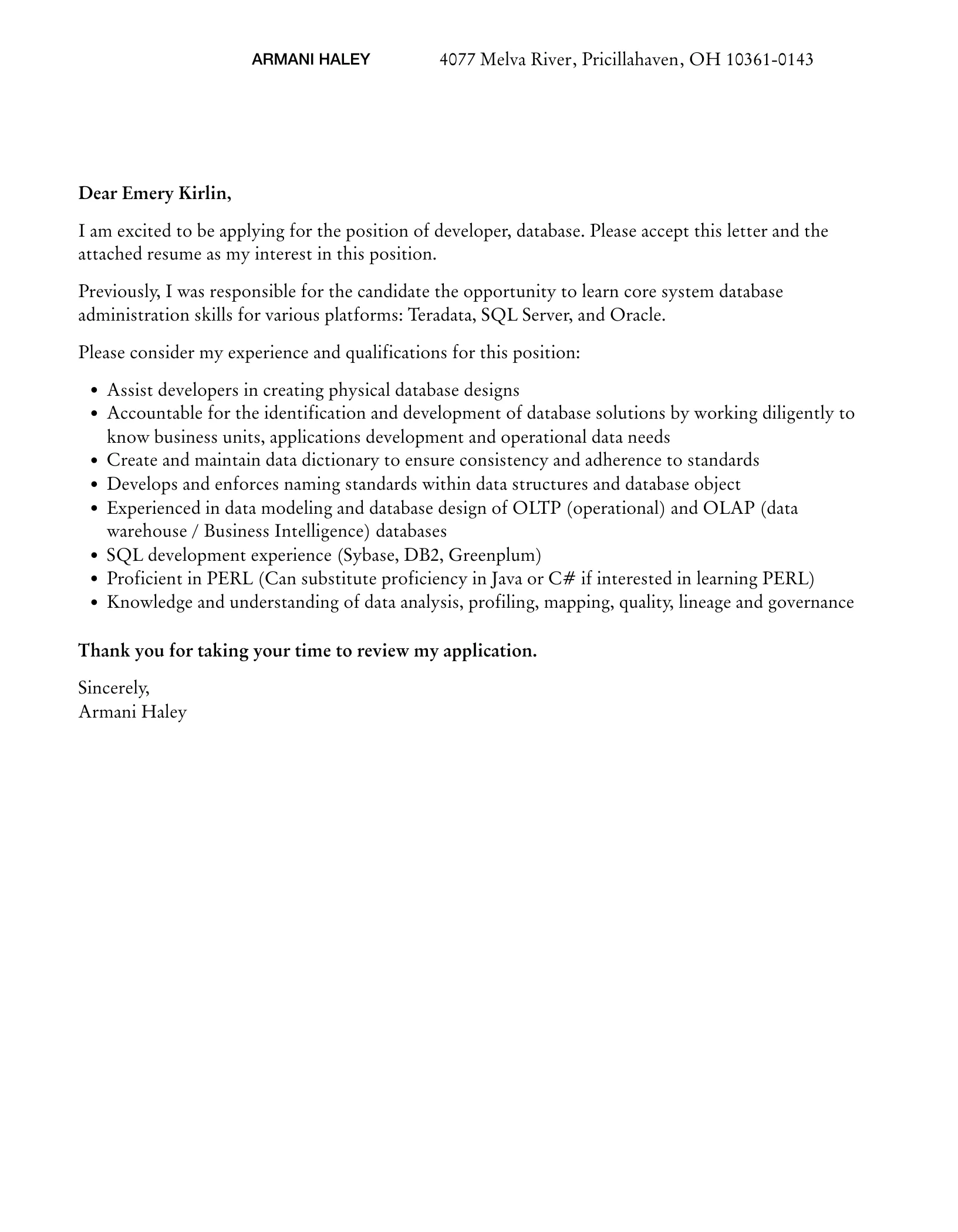
The body of your cover letter is where you demonstrate the value you bring to the table. Focus on the skills and experiences that are most relevant to the specific job description. This is not a place to rehash your entire resume. Instead, select a few key achievements and explain them in detail. Use the STAR method (Situation, Task, Action, Result) to describe a past project or situation where you utilized your database development skills to achieve a positive outcome. For instance, highlight your expertise in SQL, database design, or experience with DBMS such as MySQL, PostgreSQL, or Oracle. Illustrate how you improved database performance, optimized data queries, or successfully managed complex data migrations. Quantify your achievements whenever possible. Did you reduce query execution time by a certain percentage? Did you increase the efficiency of a database system? Showing that your skills deliver measurable results is essential. Focusing on the company’s specific needs helps demonstrate your understanding and enthusiasm.
Tailor Your Letter to the Job Description
Generic cover letters are easily spotted and often disregarded. A key secret to cover letter success is tailoring each letter to the specific job and company. Carefully read the job description and identify the key skills and requirements the employer is seeking. Then, customize your letter to address those needs directly. Use keywords from the job description, and demonstrate how your skills and experiences align with their requirements. Research the company to understand their values, culture, and recent projects. This will allow you to demonstrate genuine interest and show how you would fit into their team. Include examples of how your previous work aligns with the company’s mission or values. By tailoring your letter, you show the employer that you’ve taken the time to understand their needs and that you are genuinely interested in the position, significantly increasing your chances of getting an interview.
Quantify Your Achievements
To make your cover letter stand out, focus on quantifying your achievements. Instead of saying you “improved database performance,” state that you “optimized database queries, resulting in a 30% reduction in query execution time.” Numbers and metrics provide concrete evidence of your abilities and accomplishments. Whenever possible, use data to illustrate your impact. Did you increase the efficiency of data retrieval, reduce database errors, or improve data security? Include specific figures that showcase your ability to deliver results. This could include percentages, dollar amounts, or specific metrics. Quantifying your achievements makes your claims more credible and demonstrates the tangible value you bring to a company. It’s about proving your impact beyond just describing tasks you’ve performed.
Show Enthusiasm and a Strong Closing
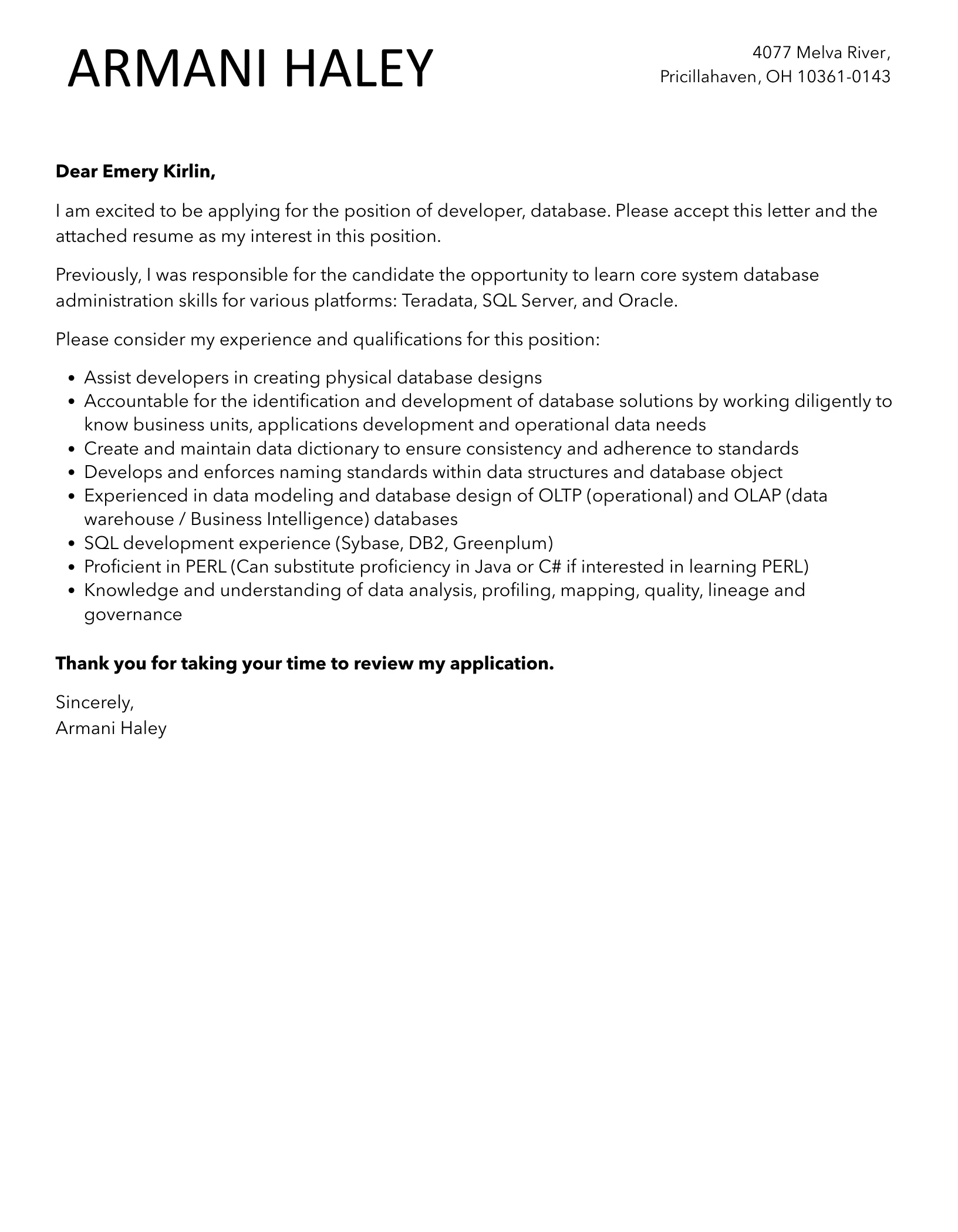
Concluding your cover letter with enthusiasm and a clear call to action is vital. Reiterate your interest in the position and express your excitement about the opportunity to contribute to the company. Summarize your key qualifications and reiterate your belief that you’re a strong fit for the role. End with a clear statement of your desire for an interview and how to contact you. Thank the hiring manager for their time and consideration. A professional closing should leave a positive lasting impression. Proofread your letter carefully to ensure there are no errors. This closing paragraph is the final chance to convince the reader that you’re the perfect candidate. Include a statement like, ‘I am eager to discuss how my skills can benefit your team and look forward to hearing from you soon.’ This shows your professionalism, enthusiasm, and your commitment to landing the job.
Key Skills for Database Developers
Successful database developers possess a range of technical and soft skills. A strong foundation in these core areas is essential for navigating the complexities of data management. Focusing on these key skills is also critical to crafting a strong cover letter.
Proficiency in SQL
SQL (Structured Query Language) is the cornerstone of database development. Developers must be proficient in writing complex queries, creating and managing database schemas, and optimizing query performance. A deep understanding of SQL is necessary for data manipulation, retrieval, and ensuring data integrity. SQL is essential for interacting with relational databases and managing data effectively. Demonstrating your SQL skills is a critical element of your cover letter, providing evidence of your ability to extract insights and maintain database operations effectively. Be sure to highlight experience with different SQL dialects such as MySQL, PostgreSQL, or SQL Server.
Database Design and Modeling
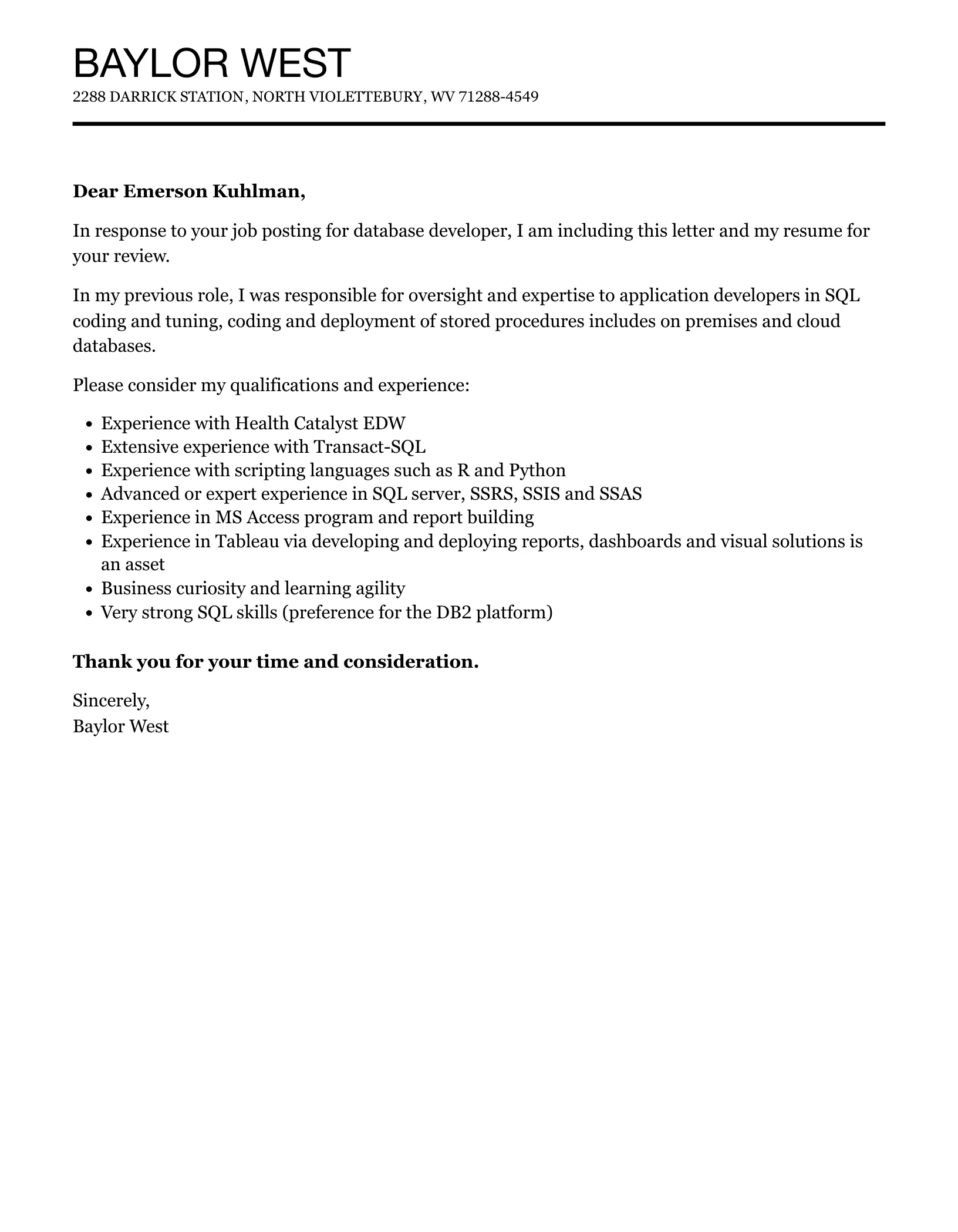
Designing and modeling databases involves creating the architecture for efficient data storage and retrieval. Database developers need to understand the principles of database design, including normalization, data modeling, and schema design. Skills in creating entity-relationship diagrams (ERDs) and understanding database relationships are crucial. Proficiency in data modeling helps prevent data redundancy and ensures data integrity. This also involves choosing the correct data types, designing efficient indexes, and optimizing database performance. This skill ensures that data can be stored and accessed efficiently. Your cover letter should showcase your ability to design databases that meet specific business requirements.
Experience with Database Management Systems (DBMS)
Database developers must have experience with various Database Management Systems (DBMS) like MySQL, PostgreSQL, Oracle, or SQL Server. Each DBMS has its features, strengths, and weaknesses. Practical experience with different DBMS allows developers to choose the best system for their requirements. It’s important to highlight any certifications or specific knowledge related to a specific DBMS, as this could be a key requirement for certain roles. Include experience with database administration tasks, such as performance tuning, backups, and security management. Emphasize the ability to manage databases effectively, ensuring data is secure, accessible, and optimized for performance.
Data Analysis and Problem-Solving Skills
Database developers often analyze data to identify trends, solve problems, and optimize database performance. Strong analytical and problem-solving abilities are critical. The ability to analyze data, interpret results, and make data-driven decisions is important. Skills in troubleshooting database issues, identifying performance bottlenecks, and finding solutions are important. Experience with data mining, data warehousing, and business intelligence tools enhances your problem-solving capabilities. Showcasing your ability to analyze data and develop solutions helps you stand out as a valuable candidate.
Attention to Detail and Accuracy
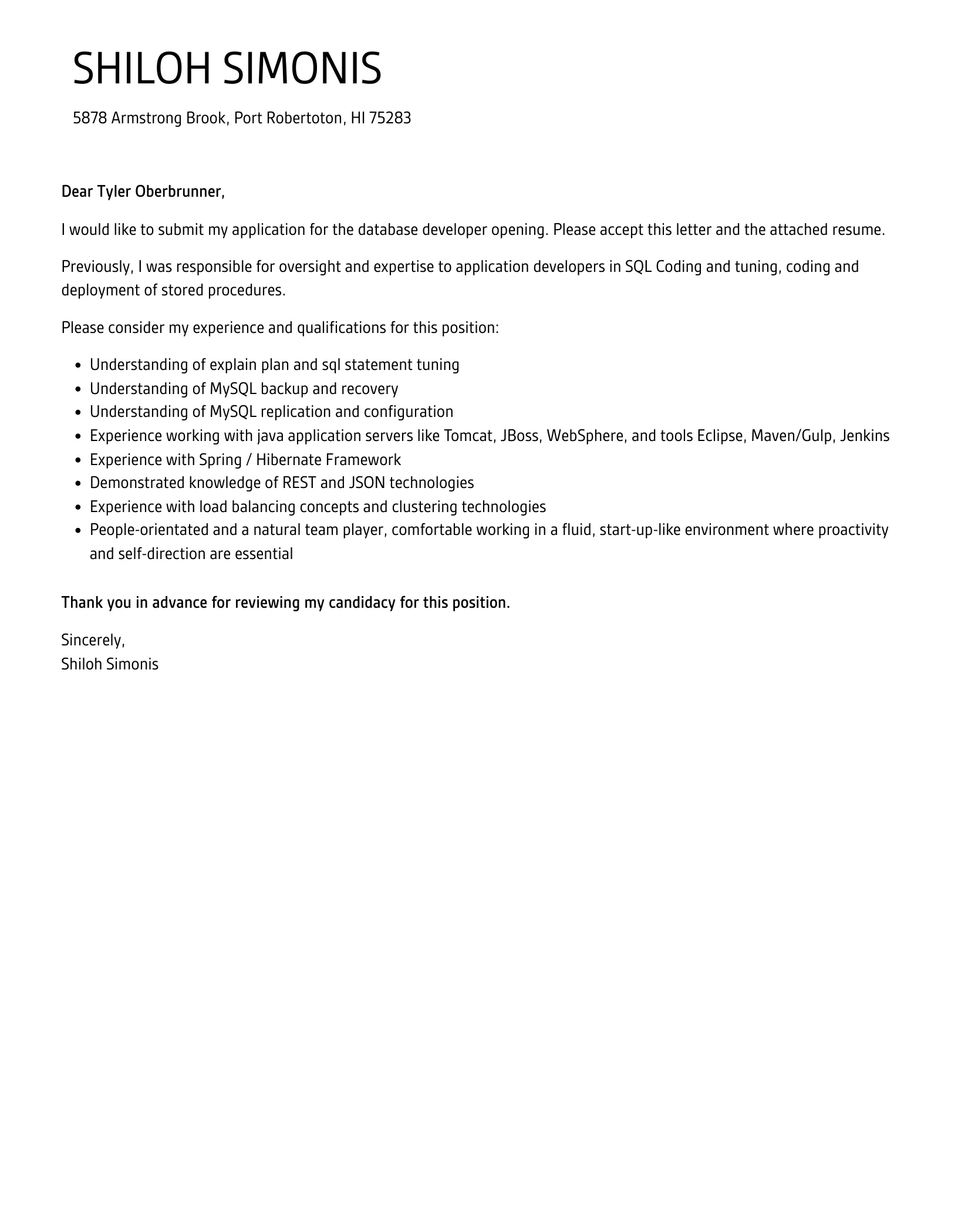
Database development requires extreme precision. Even small errors can lead to significant data integrity issues. Demonstrate your attention to detail by highlighting your ability to write clean, efficient code, ensuring the accuracy of data, and paying close attention to the specifics of database design and implementation. This means being careful to follow coding standards, test your work thoroughly, and be meticulous in managing databases and data. These elements are very important in preventing data corruption and ensuring the reliability of the system. This includes proofreading all code, documentation, and communication to identify and correct any inaccuracies. Demonstrate the ability to maintain data integrity and minimize errors through accuracy.
Common Mistakes to Avoid
Avoiding common mistakes in your cover letter can significantly improve your chances of landing an interview. Being mindful of these pitfalls will help ensure your application makes a positive impact.
Generic Cover Letters
Sending a generic cover letter is a major mistake. Generic letters lack the personalization and tailored content required to capture a hiring manager’s attention. They fail to show that you’ve taken the time to understand the company and the specific requirements of the role. Recruiters can quickly identify generic letters, and these applications are often immediately rejected. Tailor your cover letter to each job application, highlighting relevant skills and experiences specific to the position and the company. This will show your genuine interest and increase your likelihood of being invited for an interview. This is a critical aspect of a successful cover letter.
Typos and Grammatical Errors
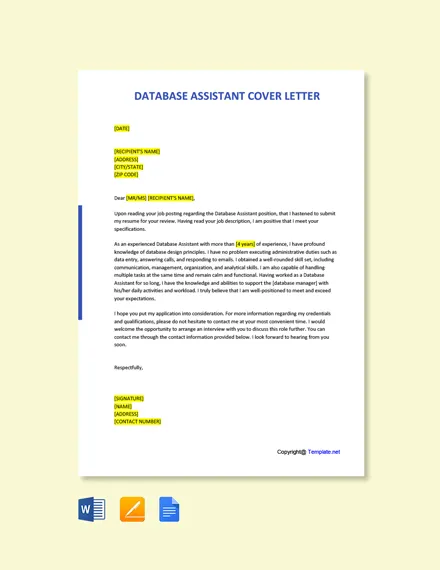
Typos and grammatical errors can be extremely damaging. They suggest a lack of attention to detail, a critical trait in database development. Always proofread your cover letter carefully, and it’s highly recommended to have someone else review it before submission. Spelling and grammatical errors suggest that you are not meticulous in your work. A well-written and error-free cover letter demonstrates professionalism and competence, increasing the chances of a positive impression. Ensuring there are no errors in your cover letter reflects your commitment to quality and makes a great impression.
Focusing Too Much on Yourself
While it’s necessary to highlight your skills and experiences, avoid making your cover letter overly self-focused. Your cover letter should be a blend of your abilities and the company’s needs. The primary goal of your cover letter is to articulate how your skills and experience align with the employer’s needs. Keep the focus on how you can contribute to the company’s goals and solve their challenges. This approach will make you seem like an essential asset and help show your ability to add value. A focus on their requirements shows your interest in the role and the company’s needs. A successful cover letter demonstrates that you can contribute to the team.
Failing to Tailor Your Letter
A major mistake is neglecting to tailor your cover letter to the specific job and company. This includes not including relevant keywords from the job description, and not adapting your skills and experiences. Ignoring this step shows a lack of care and genuine interest. When tailoring your letter, address the specific requirements of the job and illustrate how your skills and experience meet those needs. Researching the company and mentioning their projects or values will demonstrate your enthusiasm. By personalizing your cover letter, you significantly improve your chances of getting noticed by recruiters and getting an interview.
Ignoring the Company Culture
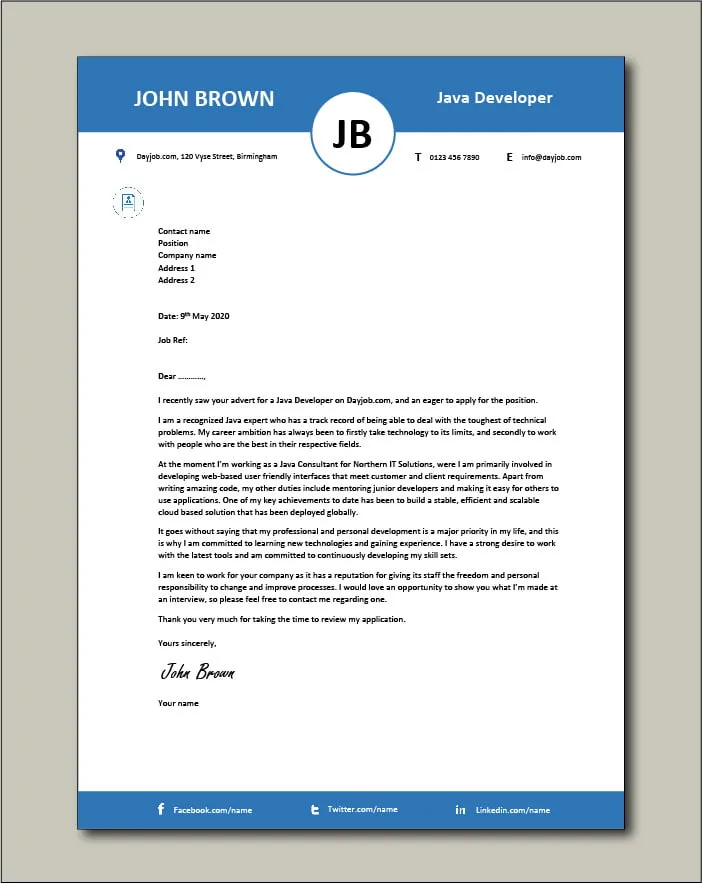
Failing to consider the company culture is another misstep. Understanding the company’s values, mission, and work environment is essential. A cover letter that doesn’t reflect these aspects might seem like a mismatch, even if your technical skills are good. Research the company and align your tone, style, and examples with their culture. If the company values innovation and collaboration, emphasize these aspects in your cover letter. Showing that you understand the company’s values can strongly indicate your fit. This insight can improve your chances of progressing. If you display your cultural fit, you increase your chances of making a lasting impression.
Formatting and Presentation Tips
The formatting and presentation of your cover letter play a key role in making a positive impression. Pay attention to these details to ensure your letter is both visually appealing and easy to read.
Use a Professional Font and Layout
Selecting a professional font and a clear layout is very important. Use a standard, easy-to-read font such as Arial, Times New Roman, or Calibri. A professional layout ensures your cover letter is easy to read and aesthetically pleasing. Use clear headings, ample white space, and consistent formatting. A clean and organized layout helps the hiring manager quickly find relevant information. A well-formatted cover letter shows professionalism. Ensure your layout is clean and well-organized so you can present your qualifications effectively.
Keep it Concise and Readable
Keep your cover letter concise and easy to read. Aim for one page. Use short paragraphs and bullet points to present key information in an easy-to-digest format. The goal is to convey your message clearly and efficiently. Keep the language straightforward and avoid jargon that isn’t essential. Recruiters read many cover letters, so make it easy for them to quickly understand your qualifications. Highlight your most relevant experiences and skills without overwhelming the reader. A concise cover letter shows that you value the reader’s time. A well-formatted letter makes it simple to understand the important information.
Proofread Carefully
Always proofread your cover letter meticulously. Errors in grammar, spelling, or punctuation can immediately damage your chances. Before submitting, review your cover letter multiple times, and ideally, have a friend or colleague proofread it as well. Even a single mistake can create a negative impression. Proofreading will ensure that your cover letter is polished, professional, and error-free, highlighting your attention to detail and commitment to quality. A properly proofread cover letter shows your dedication to excellence.
Call to Action and Next Steps
A clear call to action is essential for concluding your cover letter effectively. Make sure you are clear about your intentions and the next steps you wish to take. This shows that you are genuinely interested in the role and enthusiastic about the opportunity.
Express Your Interest in an Interview
End your cover letter by explicitly stating your interest in an interview. Clearly state that you are available for an interview and eager to discuss how your skills and experiences align with the company’s needs. This shows that you are serious about the position and ready to take the next step in the hiring process. Indicate that you are looking forward to the opportunity to discuss your qualifications further. Expressing your interest in an interview is a clear way to advance your application and helps the recruiter understand your engagement.
Thank the Reader for Their Time and Consideration
Always conclude your cover letter by thanking the reader for their time and consideration. A simple expression of gratitude demonstrates your respect and professionalism. Thank the hiring manager for reviewing your application and for considering you for the position. This is an important element of a professional close and leaves a positive impression on the reader. Such gratitude demonstrates your appreciation for the reader’s effort and shows a thoughtful approach. Thanking the reader is a gracious gesture that helps demonstrate professionalism and courtesy.
